Efficient listening with two ears Dichotic time compression and spatialization
提高听力的英语作文
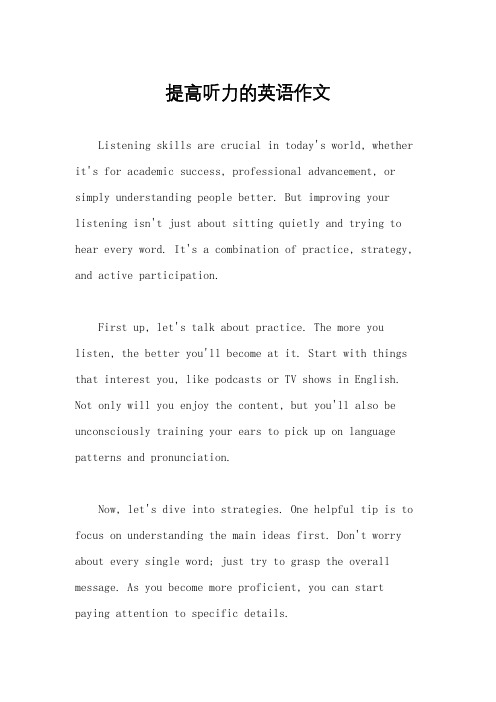
提高听力的英语作文Listening skills are crucial in today's world, whether it's for academic success, professional advancement, or simply understanding people better. But improving your listening isn't just about sitting quietly and trying to hear every word. It's a combination of practice, strategy, and active participation.First up, let's talk about practice. The more you listen, the better you'll become at it. Start with things that interest you, like podcasts or TV shows in English. Not only will you enjoy the content, but you'll also be unconsciously training your ears to pick up on language patterns and pronunciation.Now, let's dive into strategies. One helpful tip is to focus on understanding the main ideas first. Don't worry about every single word; just try to grasp the overall message. As you become more proficient, you can start paying attention to specific details.Another strategy is to actively engage with what you're hearing. Ask yourself questions about the content or try to predict what's going to happen next. This keeps your mind active and engaged, which makes learning more effective.Oh, and don't forget about technology! There are loads of apps and online tools that can help you improve your listening skills. These often include quizzes, simulations, and even games that make learning fun and engaging.Lastly, remember that it's okay to make mistakes. Don't be afraid to admit when you don't understand something;it's all part of the learning process. The key is to keep going, keep practicing, and eventually, you'll notice your listening skills getting better and better.So there you have it! Improving your listening skills isn't rocket science; it just takes a bit of practice, strategy, and engagement. With these tips in mind, you'll be well on your way to becoming a better listener in no time!。
论述听是否比说更重要的英语作文
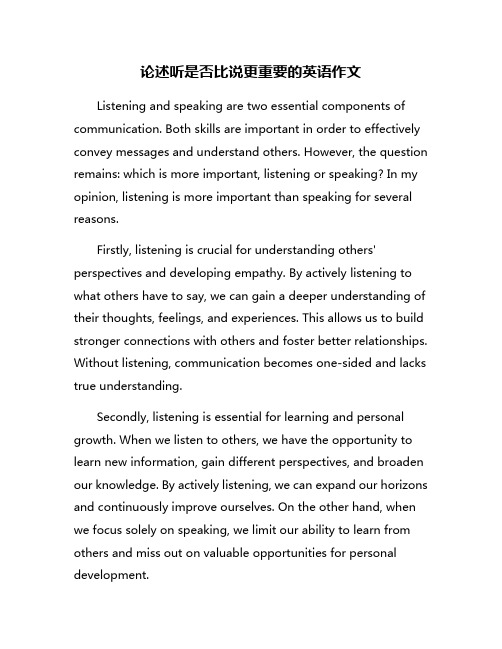
论述听是否比说更重要的英语作文Listening and speaking are two essential components of communication. Both skills are important in order to effectively convey messages and understand others. However, the question remains: which is more important, listening or speaking? In my opinion, listening is more important than speaking for several reasons.Firstly, listening is crucial for understanding others' perspectives and developing empathy. By actively listening to what others have to say, we can gain a deeper understanding of their thoughts, feelings, and experiences. This allows us to build stronger connections with others and foster better relationships. Without listening, communication becomes one-sided and lacks true understanding.Secondly, listening is essential for learning and personal growth. When we listen to others, we have the opportunity to learn new information, gain different perspectives, and broaden our knowledge. By actively listening, we can expand our horizons and continuously improve ourselves. On the other hand, when we focus solely on speaking, we limit our ability to learn from others and miss out on valuable opportunities for personal development.Additionally, listening is crucial for effective problem-solving and conflict resolution. By listening to others' viewpoints and concerns, we can identify common ground, address misunderstandings, and find mutually beneficial solutions. Without listening, conflicts escalate, communication breaks down, and relationships suffer. Therefore, developing strong listening skills is key to resolving conflicts and maintaining healthy relationships.Moreover, listening is crucial in professional settings. Employers value employees who can effectively listen to instructions, feedback, and colleagues' perspectives. Good listening skills are essential for collaboration, problem-solving, and overall success in the workplace. By honing our listening skills, we can enhance our performance at work and excel in our careers.In conclusion, listening is more important than speaking for effective communication and personal growth. By actively listening to others, we can understand their perspectives, learn new information, resolve conflicts, and succeed in both personal and professional relationships. Therefore, it is essential to prioritize developing strong listening skills in order to communicate effectively and thrive in all aspects of life.。
听的能力有多重要英语作文

听的能力有多重要英语作文英文回答:The ability to listen is crucial to effective communication, fostering understanding, and building strong relationships. It enables us to comprehend information, respond appropriately, and connect with others on a deeper level.Firstly, listening is essential for understanding. When we listen attentively, we absorb information, ideas, and perspectives. It allows us to gather knowledge, learn from others, and make informed decisions. Without effective listening, communication would be fragmented and misunderstandings would be rampant.Secondly, listening fosters understanding. By listening to others, we gain insights into their thoughts, feelings, and experiences. It helps us to empathize with their perspectives, develop compassion, and resolve conflictspeacefully. Effective listening creates a bridge between individuals, fostering a sense of connection and mutual respect.Thirdly, listening builds strong relationships. When we listen to others, we show that we care about them and value their opinions. It creates a sense of trust and intimacy, which is essential for healthy relationships. By being attentive listeners, we demonstrate our willingness to engage with others, support them, and contribute to their well-being.Moreover, listening is a two-way street. Effective listening involves not only receiving information but also actively engaging with the speaker. This means asking clarifying questions, providing feedback, and offering support. By participating actively in the listening process, we demonstrate our respect for the speaker and show that we are invested in the conversation.In conclusion, the ability to listen is paramount for effective communication, understanding, and relationship-building. It enables us to comprehend information, connect with others, and create a foundation of trust and mutual respect. As such, it is a skill that should be cultivated and nurtured throughout our lives.中文回答:听的能力至关重要,因为它有助于有效沟通、促进理解和建立牢固的关系。
大床长出两只耳朵读后感悟20个字
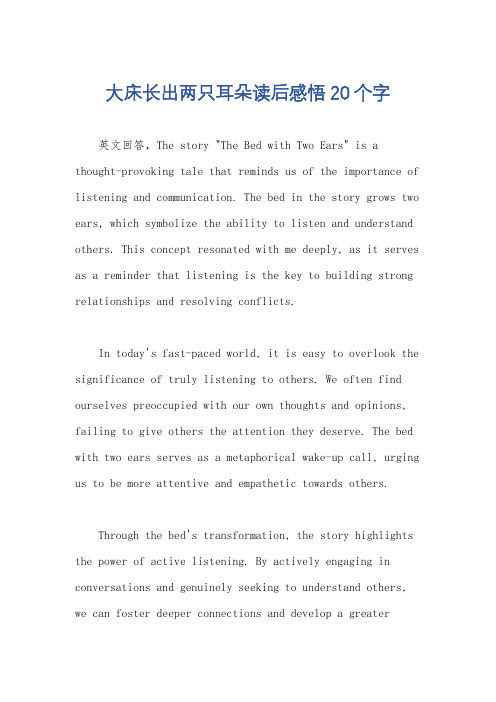
大床长出两只耳朵读后感悟20个字英文回答,The story "The Bed with Two Ears" is a thought-provoking tale that reminds us of the importance of listening and communication. The bed in the story grows two ears, which symbolize the ability to listen and understand others. This concept resonated with me deeply, as it serves as a reminder that listening is the key to building strong relationships and resolving conflicts.In today's fast-paced world, it is easy to overlook the significance of truly listening to others. We often find ourselves preoccupied with our own thoughts and opinions, failing to give others the attention they deserve. The bed with two ears serves as a metaphorical wake-up call, urging us to be more attentive and empathetic towards others.Through the bed's transformation, the story highlights the power of active listening. By actively engaging in conversations and genuinely seeking to understand others, we can foster deeper connections and develop a greatersense of empathy. The bed's ability to hear both positive and negative remarks also emphasizes the importance ofbeing open-minded and receptive to different perspectives.Moreover, the story also reminds us of the consequences of not listening. When the bed loses its ability to hear,it becomes isolated and lonely. This serves as a cautionary tale, warning us of the potential consequences ofneglecting communication in our relationships. It emphasizes the need to prioritize listening and communication in order to maintain healthy and fulfilling connections with others.In conclusion, "The Bed with Two Ears" serves as a powerful reminder of the significance of listening and communication in our lives. It encourages us to be more attentive, empathetic, and open-minded in our interactions with others. By embracing the lessons from this story, we can cultivate stronger relationships and create a more harmonious world.中文回答,《大床长出两只耳朵》这个故事给了我深刻的启示,提醒我们倾听和沟通的重要性。
听比说更重要英语作文
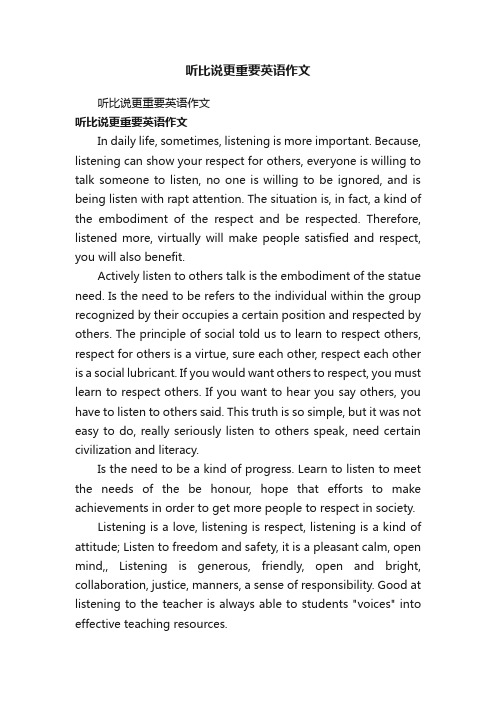
听比说更重要英语作文听比说更重要英语作文听比说更重要英语作文In daily life, sometimes, listening is more important. Because, listening can show your respect for others, everyone is willing to talk someone to listen, no one is willing to be ignored, and is being listen with rapt attention. The situation is, in fact, a kind of the embodiment of the respect and be respected. Therefore, listened more, virtually will make people satisfied and respect, you will also benefit.Actively listen to others talk is the embodiment of the statue need. Is the need to be refers to the individual within the group recognized by their occupies a certain position and respected by others. The principle of social told us to learn to respect others, respect for others is a virtue, sure each other, respect each other is a social lubricant. If you would want others to respect, you must learn to respect others. If you want to hear you say others, you have to listen to others said. This truth is so simple, but it was not easy to do, really seriously listen to others speak, need certain civilization and literacy.Is the need to be a kind of progress. Learn to listen to meet the needs of the be honour, hope that efforts to make achievements in order to get more people to respect in society.Listening is a love, listening is respect, listening is a kind of attitude; Listen to freedom and safety, it is a pleasant calm, open mind,, Listening is generous, friendly, open and bright, collaboration, justice, manners, a sense of responsibility. Good at listening to the teacher is always able to students "voices" into effective teaching resources.听比说更重要英语作文As research shows, 70% to 80% of our lifetime is spent on certain kinds of communication, such as writing, speaking and listening. Among these, listening is actually the most important technique.Then why is it that listening is more important than talking? Firstly, when we make acquaintance of someone, listening helps us understand others better and thus winning friendship. Secondly, knowing the art of listening can facilitate communication and avoid conflict with people on intimate terms, such as our parents and spouse. Last but not least, if we obey the principle of listening in the workplace, we are more likely to do the right thing and avoid detours.Therefore, it is safe to say that listening from the bottom of our hearts can bring us a lot of benefits. I would like to quote the legend John Rockefeller's words, which I can't agree more, to end my essay: "A little practice in listening can produce amazing results."听比说更重要英语作文“Listening is more important than talking.”This proverb means that listening is something worthwhile to consider when we have communication with others.People often focus on their speaking ability, believing that good speaking equals good communication. There is some truth in this statement, but people who hold this opinion ignore a more important fact. God gave people two ears and one mouth, so it requires us to keep the ratios of listening and speaking by two to one. The ability to speak well is a necessary component to successful communication. The capability of listening is as important as speaking in that listening is the best respect forpeople around us. Listen attentively when others are speaking. It is the best and the most effective compliment that you can give them.To conclude, Listening can prevent interruption or formulate a response even before other speakers have finished. Good listeners are often some of the best speakers who can improve the quality of the communication. So listeners should interact with speakers, and respond promptly.听比说更重要英语作文“Listening is more important than talking.”This proverb meansthat listening is something worthwhile to consider when we havecommunication with others.People often focus on their speaking ability, believing thatgood speaking equals good communication. There is some truth inthis statement, but people who hold this opinion ignore a moreimportant fact. God gave people two ears and one mouth, so itrequires us to keep the ratios of listening and speaking by two toone. The ability to speak well is a necessary component tosuccessful communication. The capability of listening is asimportant as speaking in that listening is the best respect forpeople around us. Listen attentively when others are speaking. Itis the best and the most effective compliment that you can givethem.To conclude, Listening can prevent interruption or formulate aresponse even before other speakers have finished. Good listenersare often some of the best speakers who can improve the quality ofthe communication. So listeners should interact with speakers, andrespond promptly.听比说更重要英语作文As we all known, talking and listening are commonly used incommunication, but how can you talk without listening to others? Good conversation skills include much more than simply talking to others, listening is also a necessary quality of a successful person.I firmly believe that listening is of greater significance than talking. For one thing, If you can not listen correctly, you can not talk properly. Just imagine a world where everyone keep talking but nobody listening, it's useless to say anything then. For another, if you want to make achievement in social settings, relationships and business, one way to ensure your success is to be a great listener.Therefore, in order to enhance our conversation skills, here are a few simple rules we can follow to help us become a better listener, such as stopping talking endlessly, giving your full attention to the speaker and making an effort to shift the focus of the conversation to the other person. All in all, nothing can instead of listening!。
英文听力 -回复
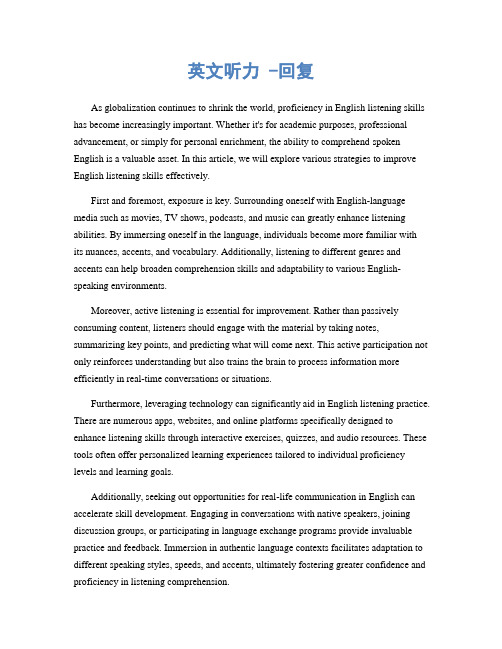
英文听力 -回复As globalization continues to shrink the world, proficiency in English listening skills has become increasingly important. Whether it's for academic purposes, professional advancement, or simply for personal enrichment, the ability to comprehend spoken English is a valuable asset. In this article, we will explore various strategies to improve English listening skills effectively.First and foremost, exposure is key. Surrounding oneself with English-language media such as movies, TV shows, podcasts, and music can greatly enhance listening abilities. By immersing oneself in the language, individuals become more familiar withits nuances, accents, and vocabulary. Additionally, listening to different genres and accents can help broaden comprehension skills and adaptability to various English-speaking environments.Moreover, active listening is essential for improvement. Rather than passively consuming content, listeners should engage with the material by taking notes, summarizing key points, and predicting what will come next. This active participation not only reinforces understanding but also trains the brain to process information more efficiently in real-time conversations or situations.Furthermore, leveraging technology can significantly aid in English listening practice. There are numerous apps, websites, and online platforms specifically designed to enhance listening skills through interactive exercises, quizzes, and audio resources. These tools often offer personalized learning experiences tailored to individual proficiency levels and learning goals.Additionally, seeking out opportunities for real-life communication in English can accelerate skill development. Engaging in conversations with native speakers, joining discussion groups, or participating in language exchange programs provide invaluable practice and feedback. Immersion in authentic language contexts facilitates adaptation to different speaking styles, speeds, and accents, ultimately fostering greater confidence and proficiency in listening comprehension.Furthermore, incorporating English into daily routines can create consistent exposure and practice opportunities. Activities such as setting devices to English language settings, reading English books or articles aloud, or even thinking and narrating daily experiences in English can reinforce listening skills subconsciously and make language learning an integrated part of daily life.Moreover, patience and perseverance are crucial throughout the learning process. Improving English listening skills takes time and dedication, and setbacks are inevitable. However, maintaining a positive attitude, staying motivated, and celebrating progress, no matter how small, are essential for long-term success.In conclusion, enhancing English listening skills requires a multifaceted approach involving exposure, active engagement, technology, real-life practice, daily integration, and perseverance. By incorporating these strategies into one's learning routine and remaining committed to improvement, individuals can unlock the full potential of their English listening abilities, opening doors to countless opportunities for personal and professional growth.。
英语听力 高效练耳
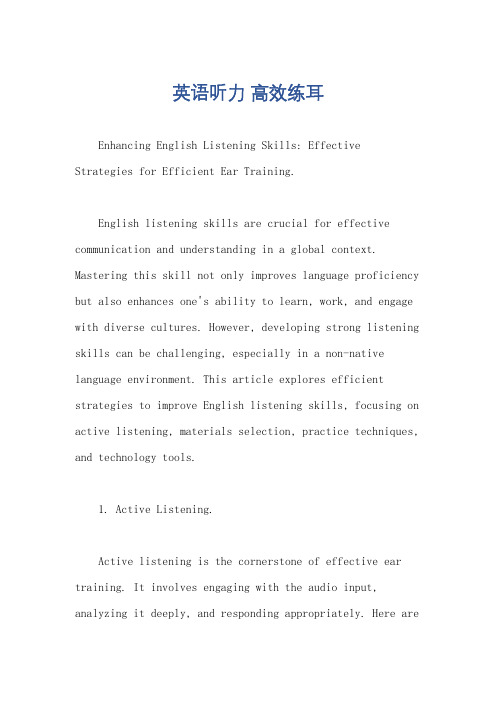
英语听力高效练耳Enhancing English Listening Skills: Effective Strategies for Efficient Ear Training.English listening skills are crucial for effective communication and understanding in a global context. Mastering this skill not only improves language proficiency but also enhances one's ability to learn, work, and engage with diverse cultures. However, developing strong listening skills can be challenging, especially in a non-native language environment. This article explores efficient strategies to improve English listening skills, focusing on active listening, materials selection, practice techniques, and technology tools.1. Active Listening.Active listening is the cornerstone of effective ear training. It involves engaging with the audio input, analyzing it deeply, and responding appropriately. Here aresome tips for active listening:Focus and Concentration: Dedicate undivided attention to the audio source. Avoid distractions and focus solely on understanding the content.Clarify Meanings: Don't hesitate to ask for clarification if something is unclear. Use your vocabulary and grammar skills to infer meanings and ask questions when necessary.Reflect and Summarize: After listening, reflect on what you heard and summarize the key points. This helps consolidate understanding and improves recall.2. Materials Selection.Choosing appropriate listening materials is essential for effective practice. Here are some guidelines for material selection:Variety: Expose yourself to a wide range of audiosources, including podcasts, news reports, conversations, lectures, and movies. This variety helps you adapt to different speaking styles, speeds, and accents.Authenticity: Use authentic English materials that reflect real-world scenarios. This will help you understand natural language patterns and expressions.Progressive Difficulty: Start with materials that are easy to understand and gradually move on to more challenging ones. This gradual progression helps build confidence and skills.3. Practice Techniques.Regular and structured practice is key to improving English listening skills. Here are some practical techniques:Daily Practice: Dedicate a daily routine to listening practice, even if it's just a few minutes. Consistency is crucial for long-term improvement.Shadowing: Shadowing involves repeating what you hear almost immediately after it's spoken. This technique helps improve pronunciation, fluency, and comprehension.Dictation: Dictation involves writing down what you hear, without looking at the text. This exercise improves listening comprehension and writing skills.4. Technology Tools.Modern technology offers a range of tools to aid in English listening practice. Here are some suggestions:Online Streaming Services: Platforms like Spotify, Apple Podcasts, and YouTube offer a wealth of English audio content. You can listen to podcasts, music, and videos to improve your comprehension.Language Learning Apps: Apps like Duolingo, Rosetta Stone, and Babbel provide structured listening practice with interactive exercises and quizzes.Voice Recognition Software: Software like Dragon NaturallySpeaking can help you practice speaking and improve pronunciation by transcribing your voice into text.In conclusion, efficient ear training for English listening requires a combination of active listening, appropriate material selection, regular practice, and technology tools. By following these strategies, you can gradually improve your English listening skills and enhance your overall language proficiency. Remember, consistent practice and dedication are the keys to success in any language learning journey.。
听还是读更加促进语言习得英文作文

听还是读更加促进语言习得英文作文大声朗读对语言学习很重要英语作文Do you often read aloud?Perhaps you do not read aloud.You used to read aloud when you were child.But now when you grew up,you stopped reading aloud.Because you all feel embarrassed。
Reading aloud is now a lost art among the boys and girls of fourteen or fifteen。
Reading aloud can help you to learn by heart,and learning by heart is very important to writing well。
It also can help you to get your pronunciation good and correct,and good pronunciation is necessary to all language learners。
Moreover,it can help you to find out certain beau-ties of language that you may not see in your silent reading。
On the con-trary,if you don't read aloud you can't learn to write naturally。
You can learn and enjoy English by reading aloud。
听比说更重要这句谚语的意思Listening is more important than speaking。
用耳朵读好英语作文
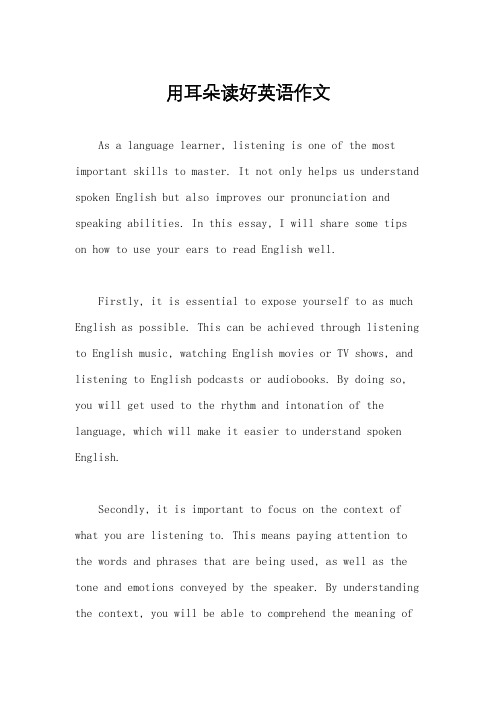
用耳朵读好英语作文As a language learner, listening is one of the most important skills to master. It not only helps us understand spoken English but also improves our pronunciation and speaking abilities. In this essay, I will share some tips on how to use your ears to read English well.Firstly, it is essential to expose yourself to as much English as possible. This can be achieved through listening to English music, watching English movies or TV shows, and listening to English podcasts or audiobooks. By doing so, you will get used to the rhythm and intonation of the language, which will make it easier to understand spoken English.Secondly, it is important to focus on the context of what you are listening to. This means paying attention to the words and phrases that are being used, as well as the tone and emotions conveyed by the speaker. By understanding the context, you will be able to comprehend the meaning ofwhat is being said, even if you don't understand everysingle word.Thirdly, it is helpful to practice active listening. This means actively engaging with what you are listening to, rather than passively letting the words wash over you. One way to do this is to take notes while you are listening, jotting down important words or phrases that you don't understand. You can then look them up later and learn their meaning.Another way to practice active listening is to repeat what you hear. This will not only improve yourpronunciation but also help you remember the words and phrases that you have heard. You can also try summarizing what you have heard in your own words, which will help you consolidate your understanding of the content.Finally, it is important to be patient and persistent. Listening is a skill that takes time and practice to develop, so don't be discouraged if you don't see immediate results. Keep listening to English as much as possible, andover time, you will notice that your comprehension and speaking abilities have improved.In conclusion, using your ears to read English well is a crucial skill for language learners. By exposing yourself to as much English as possible, focusing on context, practicing active listening, and being patient and persistent, you can improve your listening skills and become a more confident and fluent speaker of English.。
留只耳朵倾听 作文

留只耳朵倾听作文英文回答:Listen with Only One Ear.Listening is an essential skill in effective communication. It allows us to understand others, build relationships, and gain knowledge. However, in our fast-paced world, we often overlook the importance of truly listening to others. We are so focused on our own thoughts and opinions that we fail to give our full attention to the person speaking. This is where the concept of "listening with only one ear" comes into play.Listening with only one ear means being fully present and attentive to the person speaking. It means putting aside our own agenda, biases, and distractions, and truly hearing what the other person is saying. By doing so, we can foster better understanding, empathy, and connection.When we listen with only one ear, we demonstrate respect and value for the speaker. We show that we are genuinely interested in their thoughts and feelings. This can help create a safe and open environment for meaningful conversation.Moreover, listening with only one ear allows us to gain new perspectives and insights. When we are open todifferent ideas and opinions, we expand our knowledge and broaden our horizons. We become more adaptable and open-minded individuals.Listening with only one ear also helps us become better problem solvers. By fully understanding the concerns and needs of others, we can offer more relevant and effective solutions. We can collaborate and work together towards common goals.In addition, listening with only one ear can improve our relationships. When we truly listen to others, we strengthen the bond and trust between us. We show that we care and are willing to invest time and effort in therelationship.中文回答:留只耳朵倾听。
大床长出两只耳朵读后感50个字
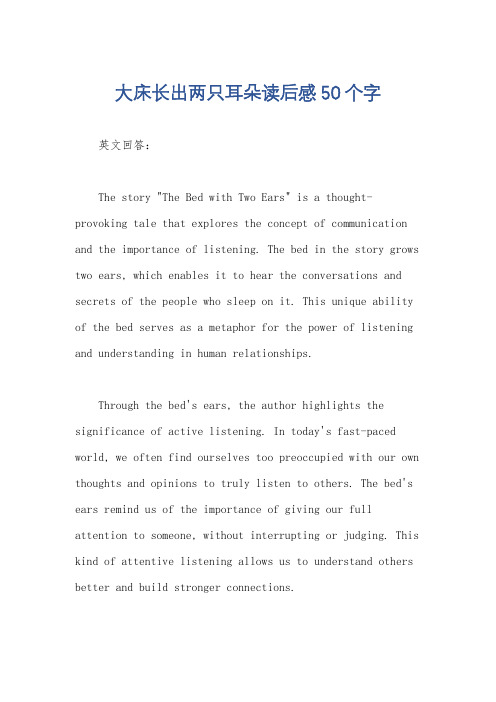
大床长出两只耳朵读后感50个字英文回答:The story "The Bed with Two Ears" is a thought-provoking tale that explores the concept of communication and the importance of listening. The bed in the story grows two ears, which enables it to hear the conversations and secrets of the people who sleep on it. This unique ability of the bed serves as a metaphor for the power of listening and understanding in human relationships.Through the bed's ears, the author highlights the significance of active listening. In today's fast-paced world, we often find ourselves too preoccupied with our own thoughts and opinions to truly listen to others. The bed's ears remind us of the importance of giving our full attention to someone, without interrupting or judging. This kind of attentive listening allows us to understand others better and build stronger connections.Furthermore, the story emphasizes the consequences of not listening. The bed overhears a couple's argument, which eventually leads to their separation. This serves as a cautionary tale, reminding us of the potential harm that can result from failing to listen to one another. It teaches us that listening is not just about hearing words, but also about understanding emotions and perspectives. By actively listening, we can avoid misunderstandings and conflicts, and foster healthier relationships.In addition, the story highlights the power of secrets and the importance of trust. The bed becomes a confidantfor its owners, as they unknowingly share their deepest secrets while sleeping. This aspect of the story reminds us that trust is essential in any relationship. When we feel comfortable enough to share our secrets with someone, it strengthens the bond between us. It also emphasizes the need for confidentiality and respect when someone confides in us.To conclude, "The Bed with Two Ears" serves as a gentle reminder of the significance of listening and understandingin our relationships. It encourages us to be more attentive and empathetic towards others, and to value the power of secrets and trust. By incorporating active listening into our daily interactions, we can cultivate stronger connections and lead more fulfilling lives.中文回答:《长出两只耳朵的大床》这个故事引人深思,探讨了沟通的概念和倾听的重要性。
英语作文听比说更重要

英语作文听比说更重要Title: The Importance of Listening in English Composition。
In the realm of learning English as a second language, the debate often arises regarding whether listening or speaking holds greater importance. While both skills are undoubtedly essential, I firmly contend that listening outweighs speaking in terms of significance. This essay delves into the reasons behind this assertion, elucidating how proficient listening skills serve as a cornerstone for effective English composition.Firstly, listening comprehension forms the bedrock upon which language acquisition stands. When individuals immerse themselves in listening exercises, they familiarize themselves with the nuances of pronunciation, intonation, and rhythm inherent in spoken English. This familiarity lays a solid foundation for building vocabulary and understanding grammatical structures. Without a keen earfor listening, attempts at speaking fluently are often impeded by misinterpretations and misunderstandings.Moreover, listening enhances one's grasp of idiomatic expressions and colloquialisms prevalent in everyday communication. English, like any language, brims with idiomatic phrases that carry cultural connotations and contextual meanings. By actively listening to native speakers, language learners glean insights into the usage and appropriate contexts for these expressions, thereby enriching their linguistic repertoire. Consequently, when crafting written compositions, individuals equipped with a robust understanding of idiomatic language can imbue their writing with authenticity and flair, thereby captivating their audience.Furthermore, effective listening fosters the development of critical thinking skills, an indispensable asset in English composition. When attentively listening to speeches, lectures, or discussions, individuals are required to process information, discern main ideas, and evaluate arguments. These cognitive processes not onlydeepen comprehension but also cultivate analyticalabilities crucial for constructing coherent and persuasive written arguments. Consequently, individuals proficient in listening exhibit greater adeptness in structuring essays, supporting claims with evidence, and articulating ideas cogently.Another compelling argument for the primacy of listening in English composition lies in its role in fostering cultural competence. Language is inherently intertwined with culture, reflecting the customs, values, and beliefs of its speakers. Through attentive listening, language learners gain insights into cultural nuances embedded within the language. This cultural awareness not only facilitates cross-cultural communication but also informs the content and tone of written compositions. A writer attuned to the cultural subtleties of the English language can tailor their writing to resonate with diverse audiences, thereby transcending linguistic barriers and fostering meaningful connections.Moreover, listening serves as a gateway to effectivecommunication skills, a cornerstone of successful writing. Proficient listening engenders empathy and receptiveness to diverse perspectives, essential qualities for engaging in dialogue and fostering mutual understanding. When individuals listen attentively to others, they demonstrate respect and consideration, laying the groundwork for constructive interactions. These interpersonal skills are invaluable in collaborative writing endeavors, where the ability to listen and integrate feedback fosters synergy and enhances the quality of the final product.In conclusion, while both listening and speaking are integral components of language acquisition, the paramount importance of listening in English composition cannot be overstated. From laying the foundation for language proficiency to fostering critical thinking, cultural competence, and effective communication skills, attentive listening underpins every facet of successful writing. Therefore, aspiring writers should prioritize honing their listening skills as a catalyst for unlocking their full potential in English composition.。
听比说重要英语作文
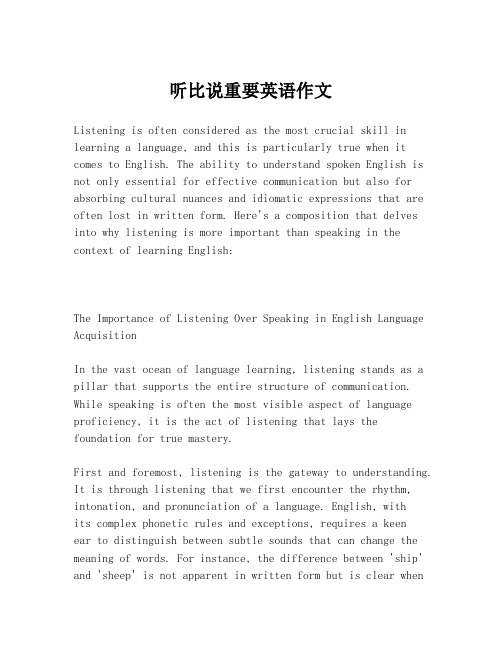
听比说重要英语作文Listening is often considered as the most crucial skill in learning a language, and this is particularly true when it comes to English. The ability to understand spoken English is not only essential for effective communication but also for absorbing cultural nuances and idiomatic expressions that are often lost in written form. Here's a composition that delves into why listening is more important than speaking in the context of learning English:The Importance of Listening Over Speaking in English Language AcquisitionIn the vast ocean of language learning, listening stands as a pillar that supports the entire structure of communication. While speaking is often the most visible aspect of language proficiency, it is the act of listening that lays the foundation for true mastery.First and foremost, listening is the gateway to understanding. It is through listening that we first encounter the rhythm, intonation, and pronunciation of a language. English, withits complex phonetic rules and exceptions, requires a keenear to distinguish between subtle sounds that can change the meaning of words. For instance, the difference between 'ship' and 'sheep' is not apparent in written form but is clear whenheard.Moreover, listening is the key to absorbing languagenaturally. When we listen to native speakers, we are exposedto the natural flow of conversation, idiomatic expressions, and colloquialisms that are integral to the language. This exposure helps us to understand the context in which certain phrases are used and to appreciate the cultural significance behind them.Listening also fosters critical thinking. It requires us to process information quickly, make inferences, and draw conclusions based on what we hear. This skill is not only beneficial for language learning but also for academic and professional settings where the ability to comprehend and analyze spoken information is paramount.Furthermore, listening is a more passive skill that can be practiced without the fear of making mistakes or being judged. It allows learners to build confidence gradually as they become more comfortable with the language. In contrast, speaking often puts learners on the spot, which can lead to anxiety and hinder the learning process.Lastly, listening is a skill that can be honed in various settings. From listening to podcasts and audiobooks to watching movies and TV shows, there are numerousopportunities to practice listening skills in a way that is both enjoyable and educational.In conclusion, while speaking is an essential component oflanguage learning, it is the art of listening that truly opens the door to understanding and mastering English. By prioritizing listening, learners can develop a deeper appreciation for the language, enhance their comprehension skills, and ultimately become more proficient speakers themselves.This composition emphasizes the multifaceted importance of listening in the process of learning English, highlighting its role in comprehension, natural language acquisition, critical thinking, confidence building, and versatility in practice.。
呵护耳朵,聆听美好主题作文

呵护耳朵,聆听美好主题作文英文回答:Taking care of our ears and listening to beautiful themes is essential for our overall well-being. Our ears play a crucial role in our daily lives, allowing us to communicate, enjoy music, and experience the world around us. Therefore, it is important to prioritize the health and well-being of our ears.One way to protect our ears is by avoiding exposure to loud noises. Prolonged exposure to loud sounds can damage the delicate structures of the inner ear, leading to hearing loss. For example, attending concerts or using earphones at high volumes can be harmful to our ears. It is important to be mindful of the volume levels and take breaks from loud environments to give our ears a rest.Another way to care for our ears is by practicing good ear hygiene. This includes cleaning our ears properly andavoiding the use of cotton swabs or other sharp objectsthat can damage the ear canal. Instead, we can use a warm cloth to gently clean the outer part of the ear. Additionally, it is important to dry our ears thoroughly after swimming or showering to prevent moisture buildup, which can lead to infections.Furthermore, it is important to seek medical attention if we experience any ear-related issues. This can include symptoms such as ear pain, ringing in the ears, ordifficulty hearing. Consulting a healthcare professional can help identify and address any underlying problems, ensuring the proper care and treatment for our ears.In addition to taking care of our physical ears, it is equally important to listen to positive and uplifting themes in our lives. This can include surrounding ourselves with supportive and encouraging people, engaging in activities that bring us joy and fulfillment, and seeking out inspiring and motivational content. By listening to positive themes, we can nourish our minds and souls, leading to a more balanced and fulfilling life.中文回答:呵护耳朵,聆听美好主题对我们的整体健康至关重要。
大床长出两只耳朵读后感

大床长出两只耳朵读后感英文回答:The story "The Bed with Two Ears" is a thought-provoking tale that explores the concept of communication and the importance of listening. It tells the story of a magical bed that grows two ears, enabling it to hear everything that is said in the room. This newfound ability leads to a series of interesting and sometimes humorous events.The bed's ability to hear conversations creates a sense of unease among the characters in the story. They become cautious and self-conscious, knowing that their words are being listened to. This highlights the power of communication and the impact our words can have on others. It serves as a reminder to be mindful of what we say and how it may affect those around us.Furthermore, the story emphasizes the significance oflistening. In a world where everyone is eager to speak and be heard, we often forget the importance of listening to others. The bed's ears serve as a metaphor for active listening, reminding us to pay attention to what othershave to say. By truly listening, we can gain a deeper understanding of others' perspectives and foster better connections with those around us.Additionally, the story touches upon the theme of trust. The characters in the story struggle with the idea of being constantly monitored and the loss of privacy. This raises questions about trust and the boundaries of personal space. It prompts us to reflect on the importance of trust in relationships and the need for open and honest communication.Overall, "The Bed with Two Ears" serves as a reminderof the power of communication and the significance of listening. It encourages us to be mindful of our words andto actively listen to others. The story also raisesthought-provoking questions about trust and privacy. It is an engaging and insightful read that leaves readerscontemplating the impact of their own communication habits.中文回答:《大床长出两只耳朵》是一个发人深省的故事,探讨了沟通的概念和倾听的重要性。
作文耳朵的重要性英语

The importance of our ears cannot be overstated as they play a crucial role in our daily lives. Here are some key aspects that highlight the significance of our ears:1. Hearing: Ears are our primary organs for hearing. They allow us to perceive sounds in our environment, which is essential for communication, safety, and enjoyment of music and other auditory experiences.2. Balancing: The inner ear contains the vestibular system, which helps us maintain our balance and spatial orientation. This system is critical for coordinating movement and preventing falls, especially in the elderly.3. Communication: Our ears enable us to understand spoken language, which is fundamental to human interaction. Without the ability to hear, communication would be significantly limited.4. Social Interaction: Hearing is a key component of social interaction. It allows us to participate in conversations, understand nonverbal cues, and respond appropriately in social settings.5. Emotional Connection: The ability to hear can foster emotional connections. Sounds of laughter, crying, or the voice of a loved one can evoke strong emotional responses.6. Warning System: Our ears act as an early warning system, alerting us to potential dangers such as a car horn, a fire alarm, or a shout for help.7. Professional Requirements: Many professions require good hearing. Musicians, pilots, doctors, and emergency responders, among others, rely on their ears to perform their jobs effectively.8. Education: For children, hearing is vital for learning. It allows them to listen to lessons, participate in classroom discussions, and develop language skills.9. Cultural Appreciation: Ears enable us to appreciate the rich tapestry of sounds in different cultures, including languages, music, and traditional soundscapes.10. SelfExpression: Our ears also play a role in how we express ourselves. The way we style our hair can affect how others perceive the shape and size of our ears, which can be an aspect of personal identity and selfexpression.In conclusion, ears are integral to our ability to navigate the world around us, connectwith others, and experience life in all its auditory richness. Protecting our hearing and taking care of our ears is essential for maintaining a high quality of life.。
一笑就露出两颗大门牙掉了英语作文
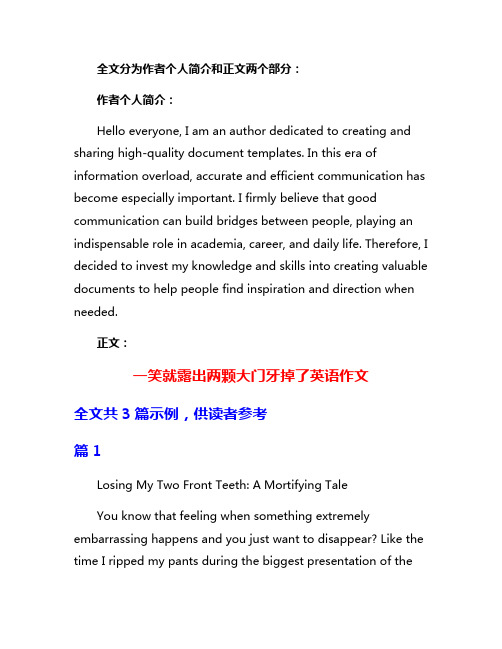
全文分为作者个人简介和正文两个部分:作者个人简介:Hello everyone, I am an author dedicated to creating and sharing high-quality document templates. In this era of information overload, accurate and efficient communication has become especially important. I firmly believe that good communication can build bridges between people, playing an indispensable role in academia, career, and daily life. Therefore, I decided to invest my knowledge and skills into creating valuable documents to help people find inspiration and direction when needed.正文:一笑就露出两颗大门牙掉了英语作文全文共3篇示例,供读者参考篇1Losing My Two Front Teeth: A Mortifying TaleYou know that feeling when something extremely embarrassing happens and you just want to disappear? Like the time I ripped my pants during the biggest presentation of thesemester. Or when I called my teacher "mom" by accident in front of the whole class. Those were awkward moments for sure, but they don't even come close to the sheer mortification I experienced when I lost my two front teeth just from smiling.It was just another typical day at school. I was wolfing down my lunch in the cafeteria, desperate to get outside for some fresh air during the break. My best friend Janie was sitting across from me, rambling on about something or other. Probably analyzing the latest drama between Sam and his on-again,off-again girlfriend. As if I even cared about their ridiculous relationship woes."Lizzie, are you even listening to me?" Janie huffed, pulling me out of my daydream about the beautiful spring day waiting for me just outside those doors."Huh? Oh, yeah, totally," I replied automatically, offering her one of my huge, signature smiles. You know, the kind of smile where you scrunch your whole face and beam so big that your eyes disappear into little curves? Well, that's the exact smile that caused my entire world to come crashing down in the most excruciatingly embarrassing way.As soon as my lips stretched into that wide grin, I felt a searing pain rip through my mouth. The next thing I knew, two ofmyefront teeth had completely dislodged and were tumbling down onto my food tray with a sickening "plop." I immediately clapped my hands over my mouth, my eyes widening in shock and horror."Oh my gosh, Lizzie! Your teeth!" Janie shrieked, her own mouth gaping open almost comically.I barely heard her over the roaring in my ears as scorching humiliation flooded my entire body. This could not be happening. She had to be joking, right? But a quick Feel around the gaping holes in my mouth confirmed that no, this was definitely not a joke. Somehow, someway, my two prized front teeth had just fallen straight out of my head.The cafeteria seemed to freeze for a torturous moment. Every head turned in our direction as my saliva-coated teeth sat there in full view, mocking me on top of my sloppy '90s geometric print tray. Then, as if a switch had been flipped, the entire room erupted into raucous laughter and taunting jeers."Hey Lizzie, Halloween's not for another six months!""Nice look, you wild thang!""Damn girl, you need some better dental hygiene!"The insults and howling guffaws sliced through me, inflicting more pain than I could have ever imagined. Tears burned my eyes as my face flushed an undoubtedly unattractive shade of crimson. I wanted nothing more than to dissolve into the ground and cease to exist in that moment.Janie reached across the table and grabbed my arm, trying and failing to stifle her own snickers. "Oh my God, I can't... Lizzie, I'm so sorry but... you should see your face right now!"She dissolved into a new peal of laughter, her shoulders shaking with mirth. Some friend she was! Furious with her for finding amusement in my utter devastation, I violently shook off her grip and bolted out of my seat. I snatched up my teeth, haphazardly shoved them in my pocket, and took off running out of the cafeteria with my head hung low.The laughter followed me all the way down the hallway until I burst through the doors and out into the courtyard. I didn't stop until I reached the far corner, a secluded little nook surrounded by bushes and trees. Finally, I collapsed onto the hard ground, pulled my knees to my chest, and let the tears flow freely.How could this have happened? I meticulously took care of my teeth. I brushed twice a day, flossed religiously, and nevermissed a dental appointment. Yet there I was, an unsightly16-year-old girl with a vacant, toothless mouth. Mortified didn't even begin to describe the cyclone of emotions swirling through me.After what felt like an eternity of harsh, gulping sobs, I reached into my pocket and pulled out the freshly dislodged teeth. They weren't in bad shape, surprisingly enough. A little saliva residue here, a few tiny specks of food particles there, but otherwise intact. Dare I even hope that the dentist could put these freshly knocked-out choppers back into my mouth?I quickly dismissed that tiny glimmer of optimism. Even if by some miracle I could get them professionally re-implanted, I'd never be able to live down the sheer humiliation of what just transpired. The footage would be burned into my peers' brains for all eternity. I was Lizzie, the Toothless Freak.Wallowing in profound self-pity, I barely registered the sound of approaching footsteps. I didn't even look up until a familiar voice spoke up."Hey... you okay?"It was Oliver, my crush since literally kindergarten andall-around catch of the school. I'm talking a total babe withtousled golden locks, crystal blue eyes, and a perfect smile that belonged on magazine covers. He was the son of a celebrieties and had plenty of opportunities to hang around vapid pretty people. So why was he, a literal Adonis incarnate, seeking me out in my state of complete dishevelment and utter emotional devastation?I must have looked every bit as pathetic as I felt because his expression twisted in concern. "Whoa, Lizzie...what happened?"My first instinct was to shoo him away, to hide my shame and mortification. But another part of me, the part permanently starved for his attention and approval, couldn't pass up this chance to be vulnerable around him. Maybe he would take pity on me and pull me into one of those perfectly sculpted embraces I daydreamed about constantly.So despite my deep humiliation, I opted to explain the whole sordid tale while trying not to burst into fresh tears. "I... I was just smiling at something stupid Janie said," I sniffed, staring down at the teeth cradled in my palms. "And then... then my teeth just... fell out! Like, legitimately fell straight out of my mouth onto my lunch tray in front of everyone!"I risked a glance up at Oliver, terrified that he would burst into hysterics like the rest of the ingrates. But to my surprise, hisexpression was serious, even... sympathetic? No trace of amusement showed on his flawless features as he dropped down onto the grass across from me."Damn, Liz... I'm so sorry, that's really messed up. Those jerks can be so cruel." His eyes were soft as they searched my face, not even flickering down to fixate on my gaping toothless mouth.A tiny spark of hope ignited in my chest. Could this be... could Oliver actually not find me repulsive in my moment of ultimate ugliness? I barely dared to breathe as he continued."You know, a similar thing actually happened to me when I was kid," he said, shaking his head ruefully. "I took a hockey puck straight to the face during a game and it knocked out four of my front teeth. Blood everywhere, pieces of teeth all over the ice... it was so gnarly."My eyes widened in surprise as Oliver reached out and ever-so-gently plucked one of the teeth from my palm. He cradled it between his fingers, studying it with reverence."These are the things that make us human, Lizzie. That give us character and flaw and Imperfection. Obsessing over maintaining some sort of pristine image is so misguided... truebeauty shines from imbracingall the weird, messed up parts about ourselves."I couldn't believe what I was hearing... was Oliver, arguably the closest thing our school had to royalty, actually relating to my situation? Praising imprefection and flaw over the societal obsession over cultivating pretttness? The sheer profoundity of his words struck me, and I felt the last of my humiliation melting away.Oliver's knee brushed against mine as he shifted closer, holding my gaze with those entrancing baby blues. "You're one of the realest, most down-to-earth people I know, Liz. Plastic surgeons and supermodels could never pull off rocking a toothless grin quite like you."Despite myself, I cracked a small篇2The Day My Two Front Teeth Fell OutIt was just an ordinary day, or so I thought. I was sitting in Mr. Anderson's math class, trying my best to follow along as he explained the principles of algebra. Math had never been my strong suit, but I was determined to get a passing grade thissemester. As Mr. Anderson droned on, I found my mind wandering, daydreaming about the upcoming weekend.Suddenly, the kid next to me, Tommy, leaned over and whispered something in my ear that made me crack up laughing.I can't even remember now what it was that he said, but at the time, it struck me as the funniest thing in the world. I threw my head back, eyes squeezed shut, and let out a massive belly laugh that seemed to shake my entire body.That's when it happened. As I was coming down from my laughing fit, I felt a sharp pain in my mouth and realized that something was very wrong. When I opened my eyes, I saw two small white objects sitting on the desk in front of me. My heart sank as I realized they were my two front teeth!I must have had a look of sheer horror on my face, because Tommy immediately stopped laughing and asked if I was okay. I opened my mouth to respond, but all that came out was "Uhhhh..." I gingerly picked up the teeth from the desk, looking at them in disbelief. How could this be happening?The rest of the class had turned to look at the commotion. Mr. Anderson furrowed his brow. "Emily? Is everything alright?" he asked, concerned.I wanted to shrink down and disappear. Instead, I shakily raised my hand, holding up the two teeth as evidence. "I...I think I chust wost my teeth..." I mumbled through my now gap-toothed mouth.The class erupted into laughter and catcalls. "Haha, look at Emily's jack-o-lantern mouth!" someone shouted. I felt my face burning with embarrassment.Mr. Anderson quickly regained control of the class. "Alright, that's enough! Emily, why don't you go see the nurse?" he suggested kindly.I nodded, gathering up my books and shoving the two teeth into my pocket. As I hurried out of the classroom, I could still hear the laughter and taunts following me into the hallway.The walk to the nurse's office seemed to last an eternity. I tried my best to act casual, keeping my mouth clamped shut and avoiding eye contact with anyone I passed. A few people did double takes as the gap-toothed girl went by.When I finally made it to the nurse, she looked bewildered as I carefully extracted the teeth from my pocket and explained what happened through my lisp. After examining my mouth, she determined that I must have knocked the two front teeth looseover time by grinding my teeth at night. The laughing fit was just the final jolt that dislodged them.The nurse called my mom, who had to leave work early to take me to our family dentist. By the time she arrived, still dressed in her nurse's scrubs, I had calmed down a bit but was dreading facing her. I never knew how she would react to these kinds of situations."Oh Emily..." she sighed, taking one look at my gap-toothed grin. To my surprise, rather than scolding me, she just pulled me into a hug. "Well, I guess the tooth fairy will be paying you a visit tonight!"My dentist was able to reinsert the teeth, securing them in place with a temporary bond. He also took impressions for a permanent bridge to be made at a later date. I would have to be very careful with my temporary teeth until then.The next day back at school was rough. Despite the dentist's efforts, my smile was still unsightly and obvious. Kids were relentless with their teasing and laughter at my expense. Even some teachers had trouble keeping straight faces when calling on me in class. My face would burn bright red as I tried to formulate responses, stumbling over words with my lisp.After about a week, I decided I had had enough. Before one of my classes, I asked the teacher if I could make an announcement to my classmates. He agreed, looking puzzled.When everyone was seated, I stood up at the front of the room. "Hey everybody," I started, fidgeting nervously. "I just wanted to say..." I took a deep breath to steel my nerves. "Go ahead and laugh. Get it all out. I know I look ridiculous."And with that, I thrust my jaw forward, displaying my gaping jack-o-lantern smile for all to see. The class cracked up in a wave of laughter and hoots.But this time, I was in on the joke. I played it up, waggling my jaw back and forth with an exaggerated goofy expression. The more the class roared with laughter, the more animated I became. I was taking back the power by showing them I could laugh at myself.When the laughter finally died down, I continued. "Alright, are we done now? Because I'm kind of sick of being a punchline. This is how I look, I can't change it right now, and the jokes are getting really old. So let's just move on, okay?"There were a few sheepish nods around the room. That was the last time anyone poked fun at me over the incident. Fromthen on, my classmates accepted me, gap-toothed smile and all. If anything, I may have even gained a bit of respect for having the self-confidence to address it head-on.My permanent bridge was completed a couple months later, restoring my smile to its former glory. But that gap-toothed period of my life will always stick with me as an important lesson in self-acceptance, self-deprecating humor, and shutting down bullies. That day I lost my two front teeth turned out to be a blessing in disguise - it helped me develop a tougher skin and a strong sense of self that would serve me well in the years to come.篇3Losing My Two Front Teeth After Just One LaughYou know that cringey children's song about the kid who loses their two front teeth? Well, that became my reality just a couple weeks ago. One laugh was all it took to turn me into the living, breathing embodiment of that silly little ditty. If only it had been as simple and cheerful as the song makes it out to be!It all started on a casual Saturday morning. I was lounging around in my pajamas, sipping some orange juice and watching reruns of old sitcoms. My dad wandered into the room, done upin his typical weekend attire of sweatpants and a bathrobe. He started chatting about something or other, but I wasn't really paying attention until he said something that struck me as utterly hilarious.I don't even remember what the funny comment was now. All I know is that one moment I was blankly staring at the TV, and the next I was doubling over in side-splitting laughter. Tears were streaming down my face and my whole body was convulsing with forceful guffaws.Then, out of nowhere, I felt two sharp pains in my mouth and tasted a weird metallic flavor. I immediately stopped laughing as I realized two of my teeth had just dislodged themselves and were now resting on my tongue! I looked down at my shaking hands in shock to find two perfectly white front teeth laying there, covered in blood and saliva."Mom! Dad!" I shouted through the increasingly intense throbbing pain. "I thunk I jush knoked out ny tuo frond teesh!" My words were already becoming slurred and difficult to understand.My parents came running in looking bewildered. When they saw the scene in front of them, with me cradling a couple of my recently detached teeth, their expressions turned to pure horror."Oh my goodness! What happened?" my mom gasped, scooping up the teeth from my hands."I...I was jus laughting ad da TV an den day jush...cabe oud!" I explained, my mouth struggling to form words properly.My parents exchanged a concerned glance. My dad suggested calling the dentist right away while my mom scrambled to find something to wrap the teeth in to preserve them. The whole situation was totally surreal.After a brief phone call, the dentist instructed us to come into the office immediately. Apparently there was a chance they could reinsert the teeth if we acted quickly enough. My mom carefully nestled the teeth into a ziploc bag filled with cold milk to keep them from drying out and dying on the car ride over.I've never felt so self-conscious and embarrassed as I did pulling up to the dentist's office with a gaping hole in my mouth.I shoved a wad of gauze between my lips in a lame attempt to hide the unsightly missing teeth. It barely helped - I just looked like a gauze-stuffed chipmunk with a underbite.The dentist ushered me back to a room and had me recount what exactly had happened. I awkwardly explained about the laughing fit, leaving out the part where I couldn't evenremember what started it all. He shook his head and tsked disapprovingly."A case of laugh-induced tooth avulsion. I've seen it a few times before in patients with poor dental hygiene and tooth decay, but it's quite rare. Tell me, when was the last time you had your teeth properly cleaned?"I thought back, suddenly realizing it had been over a year since my last dental checkup and cleaning. Oops.The dentist sighed. "I'm afraid I have some bad news. Upon examination, it appears your two front teeth had severe advanced decay and very little actual tooth structure remaining. More like shells than fully intact teeth. That's why they dislodged so easily with just moderate blunt force from laughing."Uh oh. Here came the lecture about neglecting my oral health that I deserved."The good news is that we may still be able to save these teeth today and reinsert them. The bad news is that they're in such poor condition, they'll likely only last a few weeks or months at most before needing to be replaced with implants or a permanent bridge."Well, that was less than ideal, but I'd take having my real teeth back for a little while over having to instantly get fake teeth. The dentist got to work rinsing out my mouth, cleaning and disinfecting my teeth sockets, and attempting to carefully reinsert my two front teeth back into place.An hour later, I was sent home with my teeth temporarily restored, strict instructions not to chew anything crunchy or sticky for a while, and a referral to get fitted for dental implants in the near future. I was also given a kick in the pants to take way better care of my teeth going forward.It's been a couple weeks now, and so far my reinserted teeth have managed to stay put. However, they've started to feel looser day by day, and the persistent pain reminds me I'm just on borrowed time before I become the next 20-something year old rocking a 65 year old man's dentures.I've got a consult scheduled to get the implant process started in a few days. I'm crazy nervous about it, but keeping my fingers crossed it all goes smoothly. The last thing I want is to become known as "That One Girl Who Laughed Her Teeth Out" for the next four years of college.At least I've got an interesting story to tell at parties? Although maybe I'll leave out the bloody, gauze-stuffedchipmunk parts. I'd like to keep a few friends after this whole ordeal. And you can bet your bunny teeth I'll be diligent about brushing, flossing, and getting regular cleanings from here on out! Preventative dental care is no laughing matter, folks.。
新视角研究生英语读说写2课文原文加翻译及课后答案
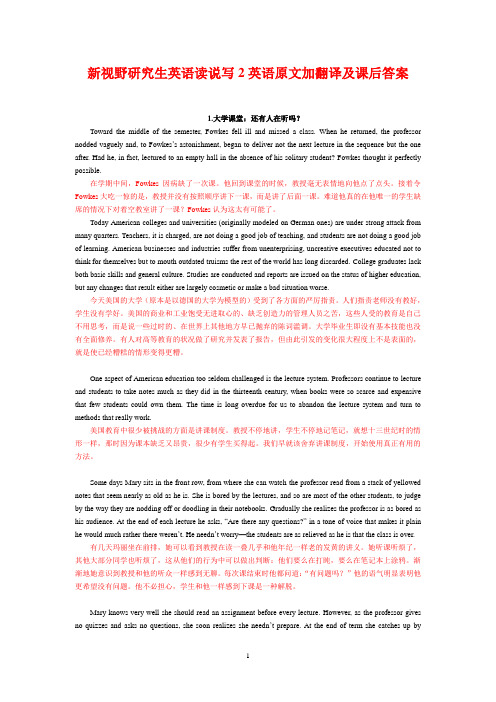
新视野研究生英语读说写2英语原文加翻译及课后答案1.大学课堂:还有人在听吗?Toward the middle of the semester, Fowkes fell ill and missed a class. When he returned, the professor nodded vaguely and, to Fowkes’s astonishment, began to deliver not the next lecture in the sequence but the one after. Had he, in fact, lectured to an empty hall in the absence of his solitary student? Fowkes thought it perfectly possible.在学期中间,Fowkes 因病缺了一次课。
他回到课堂的时候,教授毫无表情地向他点了点头。
接着令Fowkes大吃一惊的是,教授并没有按照顺序讲下一课,而是讲了后面一课。
难道他真的在他唯一的学生缺席的情况下对着空教室讲了一课?Fowkes认为这太有可能了。
Today American colleges and universities (originally modeled on German ones) are under strong attack from many quarters. Teachers, it is charged, are not doing a good job of teaching, and students are not doing a good job of learning. American businesses and industries suffer from unenterprising, uncreative executives educated not to think for themselves but to mouth outdated truisms the rest of the world has long discarded. College graduates lack both basic skills and general culture. Studies are conducted and reports are issued on the status of higher education, but any changes that result either are largely cosmetic or make a bad situation worse.今天美国的大学(原本是以德国的大学为模型的)受到了各方面的严厉指责。
有关听觉英语作文
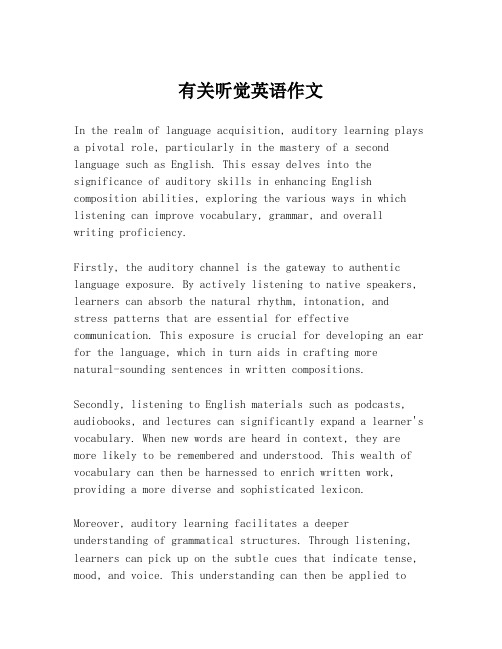
有关听觉英语作文In the realm of language acquisition, auditory learning plays a pivotal role, particularly in the mastery of a second language such as English. This essay delves into the significance of auditory skills in enhancing English composition abilities, exploring the various ways in which listening can improve vocabulary, grammar, and overallwriting proficiency.Firstly, the auditory channel is the gateway to authentic language exposure. By actively listening to native speakers, learners can absorb the natural rhythm, intonation, and stress patterns that are essential for effective communication. This exposure is crucial for developing an ear for the language, which in turn aids in crafting morenatural-sounding sentences in written compositions.Secondly, listening to English materials such as podcasts, audiobooks, and lectures can significantly expand a learner's vocabulary. When new words are heard in context, they are more likely to be remembered and understood. This wealth of vocabulary can then be harnessed to enrich written work, providing a more diverse and sophisticated lexicon.Moreover, auditory learning facilitates a deeper understanding of grammatical structures. Through listening, learners can pick up on the subtle cues that indicate tense, mood, and voice. This understanding can then be applied towriting, leading to more accurate and complex sentence construction.In addition to vocabulary and grammar, listening to English compositions, such as essays and short stories, can provide valuable insights into writing techniques and styles. By analyzing the structure and flow of professionally written pieces, learners can improve their own composition skills, learning how to create compelling narratives and arguments.Furthermore, the act of listening can also improve alearner's ability to self-edit and refine their work. By reading their compositions aloud, writers can often identify awkward phrasing or inconsistencies in tone that might go unnoticed in a silent reading. This auditory feedback loop is a powerful tool for enhancing the quality of written work.In conclusion, the auditory aspect of language learning is integral to the development of strong English composition skills. By engaging with the language through listening, learners can enhance their vocabulary, grammar, and writing style, ultimately producing more polished and professional written work. Incorporating auditory learning into language study is not only beneficial but also essential for achieving fluency and mastery in English composition.。
新视野大学英语视听说教程第二册听力练习录音文本和答案(第二版)学习啊
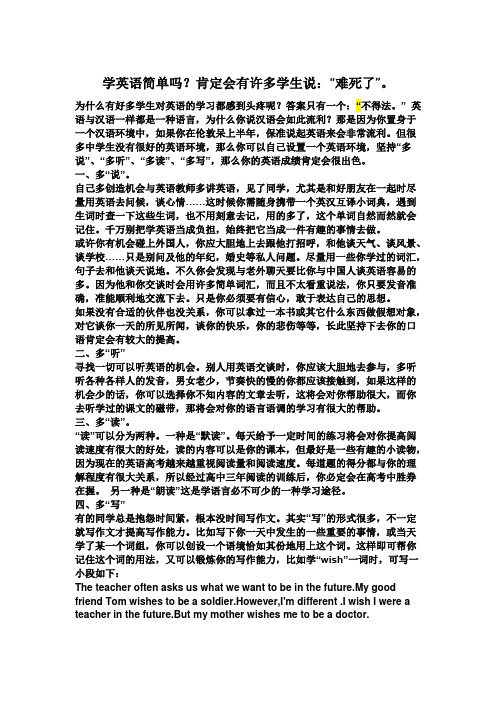
学英语简单吗?肯定会有许多学生说:“难死了”。
为什么有好多学生对英语的学习都感到头疼呢?答案只有一个:“不得法。
” 英语与汉语一样都是一种语言,为什么你说汉语会如此流利?那是因为你置身于一个汉语环境中,如果你在伦敦呆上半年,保准说起英语来会非常流利。
但很多中学生没有很好的英语环境,那么你可以自己设置一个英语环境,坚持“多说”、“多听”、“多读”、“多写”,那么你的英语成绩肯定会很出色。
一、多“说”。
自己多创造机会与英语教师多讲英语,见了同学,尤其是和好朋友在一起时尽量用英语去问候,谈心情……这时候你需随身携带一个英汉互译小词典,遇到生词时查一下这些生词,也不用刻意去记,用的多了,这个单词自然而然就会记住。
千万别把学英语当成负担,始终把它当成一件有趣的事情去做。
或许你有机会碰上外国人,你应大胆地上去跟他打招呼,和他谈天气、谈风景、谈学校……只是别问及他的年纪,婚史等私人问题。
尽量用一些你学过的词汇,句子去和他谈天说地。
不久你会发现与老外聊天要比你与中国人谈英语容易的多。
因为他和你交谈时会用许多简单词汇,而且不太看重说法,你只要发音准确,准能顺利地交流下去。
只是你必须要有信心,敢于表达自己的思想。
如果没有合适的伙伴也没关系,你可以拿过一本书或其它什么东西做假想对象,对它谈你一天的所见所闻,谈你的快乐,你的悲伤等等,长此坚持下去你的口语肯定会有较大的提高。
二、多“听”寻找一切可以听英语的机会。
别人用英语交谈时,你应该大胆地去参与,多听听各种各样人的发音,男女老少,节奏快的慢的你都应该接触到,如果这样的机会少的话,你可以选择你不知内容的文章去听,这将会对你帮助很大,而你去听学过的课文的磁带,那将会对你的语言语调的学习有很大的帮助。
三、多“读”。
“读”可以分为两种。
一种是“默读”。
每天给予一定时间的练习将会对你提高阅读速度有很大的好处,读的内容可以是你的课本,但最好是一些有趣的小读物,因为现在的英语高考越来越重视阅读量和阅读速度。
- 1、下载文档前请自行甄别文档内容的完整性,平台不提供额外的编辑、内容补充、找答案等附加服务。
- 2、"仅部分预览"的文档,不可在线预览部分如存在完整性等问题,可反馈申请退款(可完整预览的文档不适用该条件!)。
- 3、如文档侵犯您的权益,请联系客服反馈,我们会尽快为您处理(人工客服工作时间:9:00-18:30)。
To appear in the Proceedings of the1994 International Conference of Auditory Display (Santa Fe, NM, Nov. 7–9)Efficient listening with two ears:Dichotic time compression and spatializationBarry AronsMIT Media Laboratory20 Ames StreetCambridge MA, 02139barons@AbstractTo increase the amount of information we can collect in a given amount of time, it is possible to employ signal processing techniques to speed up the rate at whichrecorded sounds are presented to the ears. Besides simply speeding up the playback, itis possible to auditorily display the signals in a way that allows us to process and in-terpret the signals more efficiently by exploiting the use of our two ears.This paper first reviews time compression techniques for increasing the amount of information that can be presented to a listener, with an emphasis on techniques thatuse two ears. The paper then describes a new technique that integrates these dichotictime compression techniques into a spatial audio display system.1IntroductionAuditory information is collected through our ears at a fixed rate and processed in our brain. To increase the amount of information we can collect in a given period of time, it is possible to employ signal processing techniques to speed up the rate at which recorded sounds are presented to a listener. These Òtime compressionÓ or Òtime scale modificationÓ algorithms have primarily been used on speech recordings. Besides simply speeding up the playback, it is possible to audi-torily display the signals in a way that allows us to process and interpret the signals more effi-ciently by exploiting the use of our two ears. These ÒdichoticÓ time compression techniques present different portions of the audio signal to each ear, increasing intelligibility.1 Current spatial audio display systems attempt to take advantage of the fact that human listen-ers have two ears by creating virtual sound sources that are synthesized over headphones. How-ever, one of the fundamental design premises of a spatial audio system conflicts with the presen-tation needs of a dichotic time compression algorithm. This prevents the use of the dichotic time compression technique with a conventional spatial audio system.This paper first reviews time compression algorithms for increasing the amount of informa-tion that can be presented to a listener, with an emphasis on methods that use two ears. The paper 1Dichotic refers to two different signals that are presented to the ears over headphones.then describes a new technique that integrates these dichotic time compression techniques into a spatial audio display system to further increase the bandwidth of the listener.2Time compressionOne technique for increasing listening capacity is by time compressing an auditory signalÑto play back an audio recording in less time than it took to record. A wide variety of time com-pression techniques have been developed that allow audio recordings (the primary focus has been on speech) to be presented at a faster rate without seriously degrading the audio quality. Sponta-neous, or conversational, speech can be time compressed by a factor of about two and still re-main intelligible and comprehensible [1, 2, 3, 4].2 Time compression techniques rely on the tem-poral redundancy of speech as demonstrated by Miller and LickliderÑthe intelligibility of speech recordings interrupted by periods of silence remains high if the number of interruptions per second and the portion of time the speech is on are properly selected [5].A) Original signalB) Sampling method Figure 1: Part (A) shows the original signal divided into short (e.g., 50Êms segments). Part(B) shows the signal time compressed by the sampling method with every other segment removed. The amount of time compression can be varied by changing the relative lengths of the retained and discarded segments.One of the simplest techniques to time compress a recording is the sampling, or Fairbanks,method [6]. This technique consists of removing short segments of the signal at regular time in-tervals (figure 1). For speech recordings these segments are usually longer than a pitch period (>Ê~10Êms) and shorter than a phoneme (<Ê~100 ms), and are often 30Ð60Êms. The perceived quality of a signal time compressed by this method can be improved by performing a short cross fade 3 (figure 2) rather than simply abutting the segments (as shown in figure 1B).Cross fade regionUnmodified regionFigure 2: A linear cross fade between segments of the sampling method to reduce distor-tions.2There are many factors that influence the maximum practical time compression including: the listenerÕs familiarity with the material, the rate and content of the original speech, the compression technique, and the listenerÕs prior experience with time compressed speech.3Decreasing the amplitude of the end of one segment while increasing the amplitude of the beginning of the next segment.The synchronized overlap-and-add (SOLA) method of time compression further improves the quality of the speech by ensuring that the segments are optimally aligned before performing the cross fade [7, 8]. This is done by checking different amounts of overlap between the end of one speech segment and the beginning of the next to find where the signals are the most similar (i.e., by computing the cross correlation). This technique requires more computation, but it effec-tively removes entire pitch periods, and produces better sounding speech than the sampling method.3Integrating information between the earsThere are a variety of psychoacoustical phenomena that illustrate the human ability to inte-grate information presented to both ears (e.g., localization, lateralization, binaural masking level differences, and binaural beatsÑsee [9]).Speech signals are treated differently than tones or noise in higher levels of human auditory processing, and are grouped more cohesively than other sounds [10]. For example, the continuity of pitch helps control attention when speech signals are presented to both ears. Gray and Wed-derburn showed that although there is a tendency to group signals according to the ear they are presented to, this can be overcome if there are strong cues that favor a different grouping [11, 12]. Their study showed a preference for grouping by meaning rather than by ear for digits pre-sented dichotically with words or syllables.4Dichotic presentation of time compressed speech (DTCS)The sampling time compression technique illustrated in figure 1 reduces the listening time by discarding a portion of the original signal. The time compressed speech is typically presented over a loudspeaker or diotically4 over headphones. However, rather than simply removing the material, it is possible to play the portion of the signal that would normally be discarded to the other ear (figure 3).To ear 1To ear 2orFigure 3: Presenting speech that has been time compressed with the sampling method to both ears. Segments can be completely overlapped (left), or offset by half of a sampling period (right).This style of presentation of dichotic time compressed speech (hereafter DTCS) was first de-scribed by Scott in the mid 1960s [13]. Scott reports that subjects found the dichotic presentation to be more intelligible than a diotic presentation. The dichotic speech sounds a bit annoying at first, as most listeners switched attention between their ears, but this unusual sensation became less noticeable over time. Scott says Òalthough É there is a temporal mismatch of the two speech signals when presented dichotically, a fusing of information at both ears must take place to in-4Diotic presentation is when the same signal is presented to both ears over headphones.crease the intelligibilityÓ [13, p. 64]. Gerber showed that under a variety of different configura-tions intelligibility of time compressed speech was always better for dichotic presentation than with diotic presentation [14, 15]. With a properly selected discard interval (the length of audio segment removed from the signal and played to the opposite ear), word intelligibility errors de-creased 49% for a 2:1 time compression under dichotic conditions [15].5It is also possible to create an analogous dichotic SOLA signal by processing speech through the SOLA algorithm a second time with an offset in the starting point. Note that because the al-gorithm shifts the segments to minimize irregularities between segments, a dichotic signal pro-duced with this technique may not contain all of the information contained in the original recording.5Presenting DTCS spatiallyIn spatial audio display systems one or more channels of audio are presented to the ears based on the head related transfer function (HRTF) and the spatial location of the source relative to each ear [16, 17]. For example, in figure 4A, a real sound source S is filtered based on the re-flective characteristics of the head, body, and ears (pinna) and the interaural time delay due to the path length difference to the ears to produce a virtual sound S´ when presented over headphones (figure 4B).It is useful to be able to present time compressed speech in a virtual acoustic display, such as in user interfaces that allow skimming or browsing of recorded audio material [18, 19], or sys-tems that attempt to present multiple streams of recorded speech simultaneously [20, 21]. Pre-senting speech that has been time compressed using the basic sampling or SOLA techniques in a spatial audio display system is straightforward, as it can be treated like any other audio source. However to exploit the improved intelligibility of dichotically presented time compressed speech within a spatial audio system a novel approach must be taken to spatialize DTCS.S´Figure 4: (A) Top view of a listenerÕs head and sound source S (loudspeaker) located inspace. (B) Virtual sound source S« created by a spatial audio system.5With discard intervals of 40, 50, 60, and 70 ms the intelligibility errors decreased 25, 49, 25, and 42% respectively (although the figure for a 70 ms discard interval was not found to be statistically significant).The goal of DTCS is to explicitly present different signals to each ear, while a spatial audiosystem simulates a source at some spatial position by carefully controlling interaural time and in-tensity differences as well as the monaural spectral cues in the signals reaching the two ears.These two goals and their associated acoustic cues are thus seemingly in conflict. For example, ifboth channels of a DTCS signal are placed at the same location in a spatial audio system (e.g., at S´ in figure 4B), both ears will receive a portion of the signal from each channel. Unfortunately, this cross talk will degrade the DTCS signal, as Gerber notes Òif one listens to both signals withboth ears, the intelligibility is poorer than if one listens to one signal with one ear and the othersignal with the other earÓ [14, p. 459].However, it is possible to create a virtual sound source where each ear only receives onechannel of the DTCS signal. This can be achieved by placing two virtual sound sources at thesame location, but only filtering each signal for one ear (figure 5A). One system configurationfor creating this type of auditory display is shown in figure 5B.A)B)DTCS ear 1 DTCS ear 2Figure 5: (A) Technique to present spatialized DTCS. S1« and S2« are two channels ofDTCS originating from a single virtual sound location, but each is only presented to a sin-gle ear. (B) System configuration for spatializing DTCS using two Beachtron boards [22].Moore says that Òwhile the most reliable cues used in the localization of sounds depends upon a comparison of the signals reaching the two ears, there are also phenomena of auditory space perception which result from monaural processing of the signalsÓ [9, p. 194]. Note how-ever, that the spatialized DTCS technique described here is not strictly presenting two monaural channels, rather there are still a variety of rich interaural cues. The HRTF cues, including interau-ral intensity differences and monaural spectral cues, are all present. The only cue that is missingis interaural time difference, since the signals received by the ears do not originate from a single audio signal (however the two DTCS signals are still are highly correlated). Speech sounds in particular are very rich in familiar information. These common speech spectral cues make it eas-ier for us to perceive these two channels as a single auditory stream [10].This spatialized DTCS technique was informally found to produce an externalized virtual image. As with the DTCS technique, the speech sounds a bit choppy, however the speech was in-telligible and comprehensible and could be localized about as well as a spatialized version of the original speech recording (time compressed, but not dichotic).6IssuesThe work presented in this paper has only scratched the surface of the spatialized DTCS technique. Further development of the underlying technique is needed as well as a formal evalua-tion to test the efficacy of this method of auditory display. Specific areas of research include: op-timizing the time difference between the DTCS channels; exploring the perceived spatial and comprehension effects of permitting a small amount of cross talk between channels (thus adding interaural time differences); and modifying the underlying spatial audio system architecture to al-low DTCS to be presented spatially without requiring the use of two separate sound processing channels. The system also needs to be tested to perceptually evaluate: if the sounds can be local-ized and externalized; if the maximum preferred time compression is degraded when the DTCS is spatialized; and if presenting spatialized DTCS enhances or hinders a listenerÕs ability to listen to multiple audio streams.The dichotic SOLA technique also needs to be explored in greater detail. With knowledge of, and access to, the internal details of the SOLA algorithm it should be possible to generate a di-chotic SOLA signal by calculating only one set of cross correlations. This will be a computa-tional improvement over using the algorithm on a separate sound segment for each ear, as well as making it possible to maximize the amount of information presented in the two signals.7ConclusionsAuditory displays can exploit the fact that we have two ears in a variety of ways. This paper has discussed techniques for dichotically presenting time compressed speech to enable high speed listening. These two-eared presentation styles can be used to (1) increase the time effi-ciency of the listener, (2) increase the intelligibility and comprehension of the material, or (3) a combination of the two.The decreasing costs of audio hardware and spatialization systems, along with their increas-ing power and accuracy are enabling audio to be considered in a variety of new application envi-ronments. Combining DTCS with spatialization may increase the power, usefulness, and accep-tance of both technologies. These and related methods of dichotic auditory display will lead to more efficient listening through the use of two ears.AcknowledgmentsMarc Davis asked challenging questions that led to the development of the spatialized DTCS technique. Atty Mullins re-cabled his hardware configuration and wrote software for the Beachtron that demonstrated spatialized DTCS. Thanks to Lisa Stifelman for discussing dichoticlistening studies and helping edit this paper. Barbara Shinn-Cunningham and Chris Schmandt also provided valuable feedback on a draft of this paper.References[1]Foulke, E. ÒThe Perception of Time Compressed Speech.Ó Ch. 4 in Perception of Lan-guage, edited by Kjeldergaard, P. M., D. L. Horton, and J. J. Jenkins, 79Ð107. Columbus, OH: Merrill, 1971.[2]Foulke, W. and T. G. Sticht. ÒReview of Research on the Intelligibility and Comprehen-sion of Accelerated Speech.Ó Psychological Bulletin72 (1969): 50Ð62.[3]Beasley, D. S. and J. E. Maki. ÒTime- and Frequency-Altered Speech.Ó Ch. 12 in Con-temporary Issues in Experimental Phonetics, edited by Lass, N. J., 419Ð458. New York: Academic Press, 1976.[4]Arons, B. Techniques, Perception, and Applications of Time-Compressed Speech. InProceedings of 1992 Conference, American Voice I/O Society, Sep. 1992, 169Ð177. [5]Miller, G. A. and J. C. R. Licklider. ÒThe Intelligibility of Interrupted Speech.Ó Journalof the Acoustic Society of America22 (1950): 167Ð173.[6]Fairbanks, G., W. L. Everitt, and R. P. Jaeger. ÒMethod for Time or Frequency Com-pression-Expansion of Speech.Ó Transactions of the Institute of Radio Engineers, Pro-fessional Group on Audio AU-2 (1954): 7Ð12. Reprinted in G. Fairbanks, Experimental Phonetics: Selected Articles, University of Illinois Press, 1966.[7]Roucos, S. and A. M. Wilgus. High Quality Time-Scale Modification for Speech. In Pro-ceedings of the International Conference on Acoustics, Speech, and Signal Processing, IEEE, 1985, 493Ð496.[8]Hejna Jr, D. J. ÒReal-Time Time-Scale Modification of Speech via the SynchronizedOverlap-Add Algorithm.Ó MasterÕs thesis, MIT, 1990. Department of Electrical Engineering and Computer Science.[9]Moore, B. C. J. An Introduction to the Psychology of Hearing. New York: AcademicPress, 3d edition, 1989.[10]Bregman, A. S. Auditory Scene Analysis: The Perceptual Organization of Sound. Cam-bridge, MA: MIT Press, 1990.[11]Gray, J. A. and A. A. I. Wedderburn. ÒGrouping Strategies with Simultaneous Stimuli.ÓQuarterly Journal of Experimental Psychology12 (1960): 180Ð184.[12]Hede, A. J. ÒAwareness of List Organization and the Gray and Wedderburn Effect.Ó Psy-chological Reports43 (1978): 371Ð374.[13]Scott, R. J. ÒTime Adjustment in Speech Synthesis.Ó Journal of the Acoustic Society ofAmerica41 (1967): 60Ð65.[14]Gerber, S. E. ÒLimits of Speech Time Compression.Ó In Time-Compressed Speech, editedby Duker, S., 456Ð465. Metuchen, NJ: Scarecrow, 1974.[15]Gerber, S. E. and B. H. Wulfeck. ÒThe Limiting Effect of Discard Interval on Time-Compressed Speech.Ó Language and Speech20 (1977): 108Ð115.[16]Wenzel, E. M. ÒLocalization in Virtual Acoustic Displays.Ó Presence1 (1992): 80Ð107.[17]Wenzel, E. M. ÒSpatial Sound and Sonification.Ó In Auditory Display: Sonification,Audification, and Auditory Interfaces, edited by Kramer, G., 127Ð150. Santa Fe InstituteStudies in the Sciences of Complexity in the Sciences of Complexity, Vol. XVII. Read-ing, MA: Addison-Wesley Publishing Company, Inc., 1994.[18]Arons, B. SpeechSkimmer: Interactively Skimming Recorded Speech. In Proceedings ofthe ACM Symposium on User Interface Software and Technology (UIST), ACM SIGGRAPH and ACM SIGCHI, ACM Press, Nov. 1993, 187Ð196.[19]Arons, B. ÒInteractively Skimming Recorded Speech.Ó Ph.D. dissertation, MIT, 1994.[20]Arons, B. ÒA Review of the Cocktail Party Effect.Ó Journal of the American Voice I/OSociety12 (1992): 35Ð50.[21]Mullins, A. T. ÒAudio Streamer: Browsing Concurrent Audio Streams.Ó MasterÕs thesis,MIT, 1995.[22]Crystal River Engineering. The Beachtron: Three-Dimensional Audio for PC-Compati-bles, Groveland, CA. 1993.。
